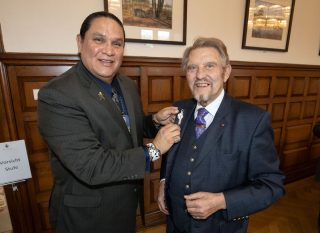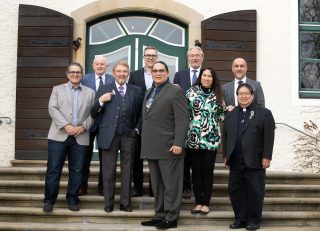Espelkamp. Important visitors from the USA: Ernest L. Stevens Jr., who is in his 19th year as Chairman of the National Indian Gaming Association (NIGA), travelled to Germany with a delegation of four to get to know the Gauselmann corporate group, the company founder and Chairman of the Management Board, Paul Gauselmann, and his native country.

The NIGA members started off their visit in Eastern Westphalia. They visited the Gauselmann Group’s production plant in Lübbecke, the company’s training centre at Schloss Benkhausen in Espelkamp and the German Coin-Op Museum, which is also located on that estate. The high-ranking guests experienced German casino flair in the MERKUR Casino arcades in Espelkamp as well as at the Bad Oeynhausen casino, where they were given a guided behind the scenes tour.
In addition, they made use of their stay to engage in intensive discussions with various company representatives, especially Paul Gauselmann, who invited Ernest L. Stevens along with Jürgen Stühmeyer (Merkur Management Board member) and Athanasios Isaakidis (Chief Executive, International) to a personal meeting. “It is a great honour for us to welcome Ernest Stevens and his delegation to the Gauselmann Group’s company headquarters. Mr Stevens has been passionately campaigning for the concerns of the Indian gaming industry in the United States for decades. Thanks to his skill, gaming revenues have been more than tripled in the past two decades. This is a remarkable achievement and a great win for the affiliated Indian tribes, that have been able to use the generated revenues to implement many social projects such as schools, kindergartens and hospitals”, said Paul Gauselmann. “In addition, I see in Mr Stevens many parallels with my own many years of association work in the German amusement and vending machine industry and am therefore delighted to be able to get to know him better personally.”

“We are delighted to have received the invitation to get to know the East-Westphalian Gauselmann Group personally and about the wonderful hospitality shown to us during our stay”, said Ernest L. Stevens during the meeting with company founder Paul Gauselmann. “It was really fascinating to see how the high-quality products of the games makers in Germany are manufactured and, like our casinos in the United States, how they also secure local jobs.”
Following the visit to the Gauselmann Group and the sightseeing tour of Berlin, the guests travelled on to London where the world’s largest gaming exhibition, ICE Totally Gaming, took place from 4–6 February. The NIGA representatives continued their discussions with Paul Gauselmann at ICE where the East-Westphalian entrepreneur gave them a guided tour of the company’s 2,000 square metre exhibition stand.
Background information to the Indian gaming sector in the USA: After the U.S. Congress passed the Indian Gaming Regulatory Act in 1988, which allowed Indian tribes to operate casinos on their territories, the Native Americans (NA) were able to work their way up economically and socially by their own efforts. They took back their self-determination and independence from the American government. The revenues of the NA casinos are not subject to taxation and this allows the Native Americans to invest the proceeds into the communities to build schools, kindergartens and hospitals. Before this legal decision, the unemployment rate in many reserves was 80 percent and many Native Americans lived on welfare.
Quelle: Gauselmann AG